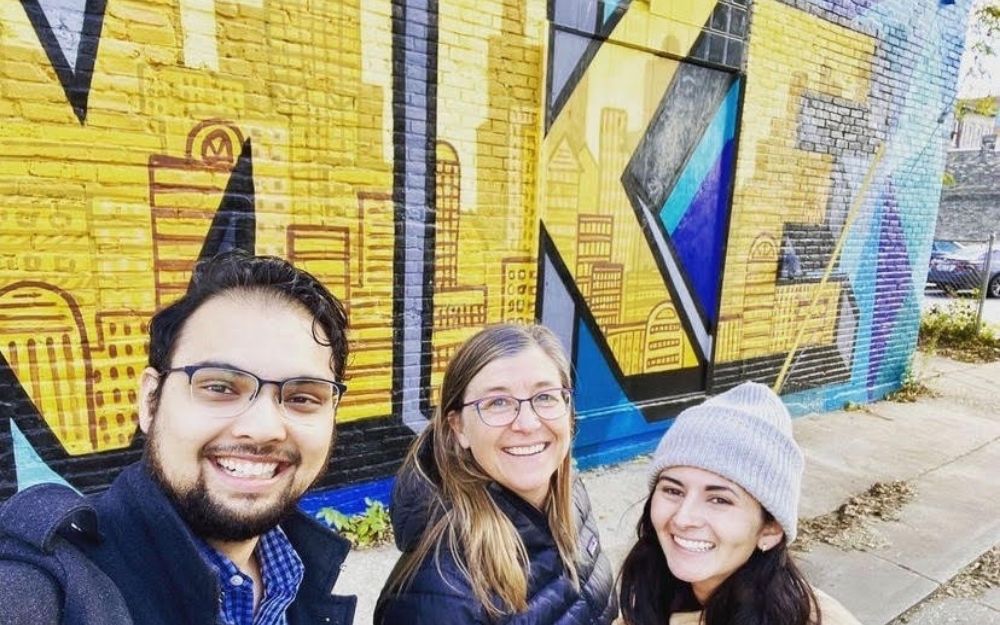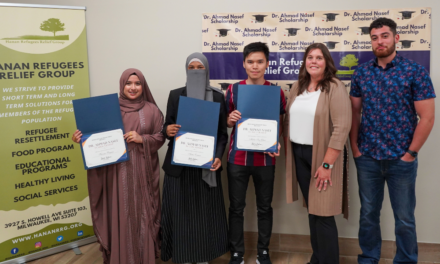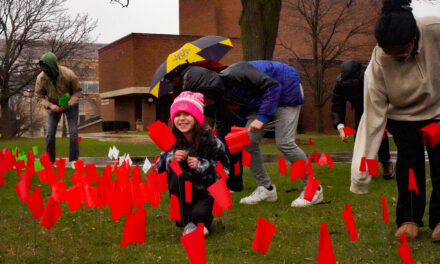Center for Water Policy team in Walker’s Point standing in front of MKE mural in 2021. From left: Misbah Husain, Melissa Scanlan (Director, Center for Water Policy), Sarah Martinez (Water Policy Specialist, Center for Water Policy).
Fremont, California, is a short train ride from Berkeley but half a continent from Milwaukee. Misbah Husain grew up in Fremont, surrounded by a supportive family and community of Pakistani Americans who helped lay the foundation for his career.
Husain is now a water policy specialist at the Center for Water Policy, a component of University of Wisconsin-Milwaukee’s innovative School of Fresh Water Sciences. On Tuesday he spoke at the Interfaith Conference of Greater Milwaukee’s annual lecture series, “Tuesdays in March,” to address the challenges of climate change on Lake Michigan. In an interview with Wisconsin Muslim Journal, Husain explained how his faith and his interest in environmentalism go hand in hand.
Husain’s great uncle came to the U.S. in 1949 to study architecture at University of California, Berkeley and sponsored many of his relatives.
“His house in North Berkeley is where each person stayed when they arrived, and it’s still in the family,” Husain says. “Though like many Muslims we’ve experienced our fair share of microaggressions and discomfort—even in the Bay—this history gave me confidence that I belong. It gave me something to continually strive for a space that’s diverse, accepting and that everyone can call home.”
Husain adds that Fremont was an Asian enclave with residents of Taiwanese, Chinese, Indian and Pakistani heritage. He describes it as “a bubble where I was able to grow up seeing people like myself in positions of power and influence. What I ate, the way I dressed, what I believed—these weren’t things that were made to feel so out of place, compared to children elsewhere in the nation, and it gave me a great love for my home.”
The career path Husain has followed can be measured by his educational track, beginning with pre-med.
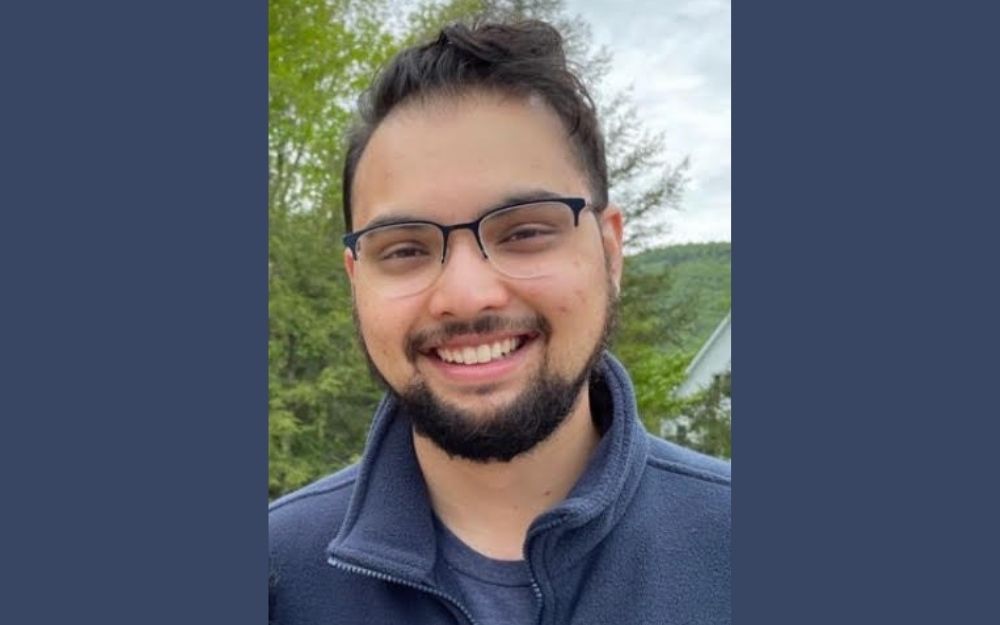
Misbah Husain is the water policy specialist at the Center for Water Policy, a component of University of Wisconsin-Milwaukee’s innovative School of Fresh Water Sciences.
“Growing up, I wanted to be a healer, to bring relief to those less fortunate,” he explains. This led to a bachelor’s degree in environmental toxicology from University of California, Davis.
“The first maxim of toxicology is ‘the dose makes the poison’—that nothing is inherently good or bad, rather, it’s the amount that dictates the harm. We see this in all levels of biology, from our cellular interactions up to environment-wide cycles.”
As a Muslim, this resonated deeply with Husain. “Islam is the religion of ‘sirat al mustaqeem,’ or ‘the middle way’ of moderation,” he says. “My studies revealed that this moderation and balance is key to all levels of existence, and this understanding set me on a path to understand more about all of our cycles and systems that make us who we are—be it in terms of biology, sociology or our political institutions.”
From UC, Davis he went to Boston College, earning a law degree as well as a master’s degree in social work. As a participant at the college’s Civil Rights Clinic, he coauthored a brief for a lawsuit challenging racially discriminatory policies in the Boston Police Department.
“Over time I learned that the sources of our sickness lay not just in the balance of our biochemistry, but our social structures and treatment of one another. The first law of ecology is that everything is connected, and I find that each of the diverse disciplines I’ve studied flow easily from one to another,” Husain said.
Islamic influences and history in environmentalism
He acknowledges Islam as the foundation and inspiration for his life’s work. “So much of our world today has been shaped by contributions from Muslim society, to advances in medicine, technology and even jurisprudence.
The practice of vaccination, for example, has its roots to manage infections during the Hajj. The concept of the jury dates back to Muslim rule in Spain. This is a legacy I’m proud of, and motivated to continue.
“On a deeper level, Muslims are encouraged to act with ‘ehsan’ or excellence, in everything they do. I’ve wanted to further my education and knowledge because doing so would be approaching my studies and blessings in this way. Learning more about this world helps me appreciate my faith, my blessings and opportunities.”
Some environmentalists have blamed the Abrahamic religions for countenancing environmental degradation. Husain answers that in the Quran, “there’s a verse that’s often translated as God stating that humans are ‘viceregents’ or ‘stewards’ of the Earth. This isn’t a full-on transfer of ownership or inheritance, this is a trust, where we are being charged with looking after creation in the way that would please our creator.”
Likewise, Islam offers guidance for all aspects of life, “and we can’t have harmony in justice in one aspect if we’re oppressive in another,” Husain continues. “Social justice—affording every human being their due rights, agency, and respect—this too is being a good steward of creation.”
Working in Water Policy and influencing stakeholders
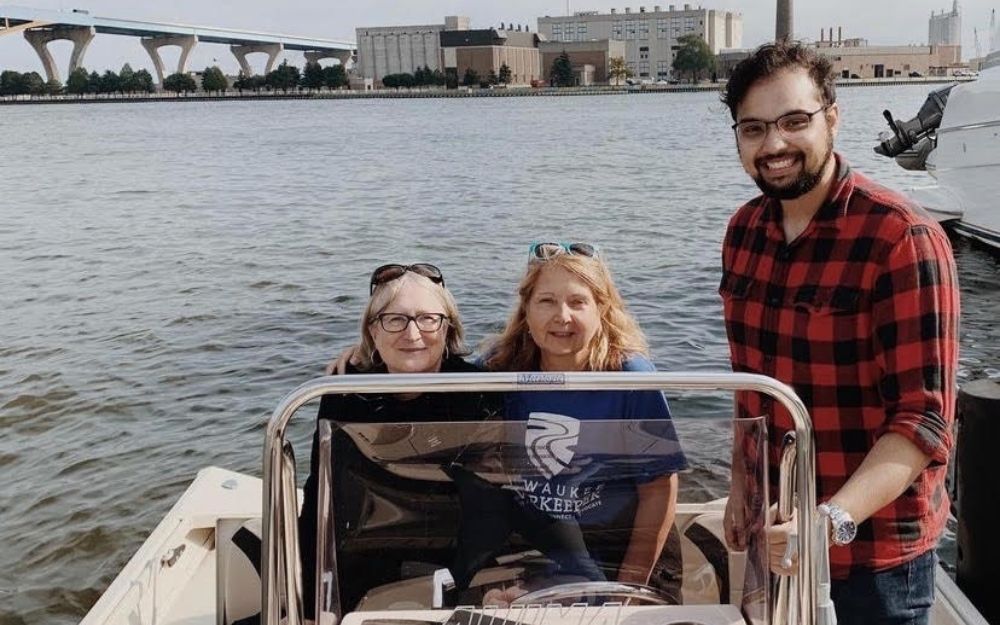
From left: Marilyn Wiseman (Assistant Director, Center for Water Policy), Cheryl Nenn (Milwaukee Riverkeeper), and Misbah Husain during a boat tour of the Milwaukee Area of Concern (AOC) along the Milwaukee, Menominee, and Kinnickinnic rivers with Milwaukee Riverkeeper.
Husain’s work at the Center for Water Policy grants him the opportunity to apply his faith in ways that are practical and beneficial to the surrounding community and the larger world.
“My colleagues and I perform legal research and policy analysis into the most pressing water issues of our time,” he explains. “The center’s mission is to provide world class interdisciplinary solutions to resolve regional, national and international problems related to the protection, restoration and conservation of freshwater resources to ensure long term environmental health and quality of life.”
In his role at the center, he has researched issues such National Flood Insurance, water infrastructure funding and—perhaps most importantly—climate change.
“I’ve been blessed to have participated in crafting some policy briefs which we have published on our website and contributed to some presentations helping the public as well as important stakeholders to understand the effects of climate change on the Great Lakes,” he said.
The rapidly changing climate of the Great Lakes region has resulted in wild fluctuations in lake levels.
“What this translates to is severe infrastructure damage due to flooding during times of high water, and disruptions to shipping and navigation in the low season,” Husain explained.
“The lake’s ecosystems are at risk because of this, too. As water temperatures increase, certain species of cold-water fish, like walleye, may be unable to thrive. Many of these species have great cultural significance for this region, and the slow loss of their ideal habitat would be incredibly tragic.”
Optimism for future generations
Many people feel a sense of impending doom when thinking about climate change. Husain remains an optimist when it comes to the future of sustaining the environment on the Earth.
“I think that sense of ‘doom’ can be reframed in a more positive light—it’s what keeps us passionate, keeps us from inaction,” he said.
“Rather than being overwhelmed by how bad things are, it’s important to remember that science tells us that humans have an incredible influence over the environment. We still have great agency to influence the warming of our environment, and if we act now, can minimize the damage caused to our world’s most vulnerable communities.”
Husain sees a lifetime of work in future years. “I hope to keep learning, to keep growing, and to be in a position where I can continue to apply all my skills to make a difference,” he said.
“My wife and I welcomed our first daughter a little over a year ago, and I would want nothing more than in 10 years to be able to share the same wonderful experiences I had growing up camping and enjoying the outdoors with her.”
The U.N.’s Intergovernmental Panel on Climate Change has given the world 10 years to reduce greenhouse gas emissions.
“I hope to be able to look back and feel content that as a whole, we were good stewards of creation, and that we banded together to ensure the best future for our children,” Husain said.
